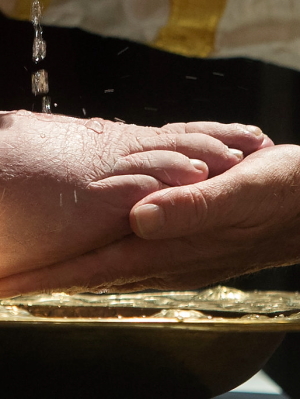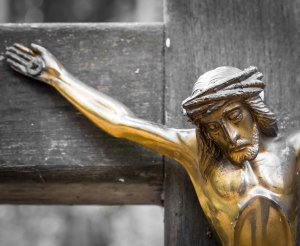THURSDAY, APRIL 14; FRIDAY, APRIL 15; and SATURDAY, APRIL 16: Western Christians across the globe entered Holy Week on Palm Sunday, and begin the Easter Triduum—recounting the final days of Jesus’s life and Passion—on Thursday, with Holy (Maundy) Thursday.

Washing feet on Maundy Thursday at Westminster Cathedral. Photo by Catholic Church England and Wales, courtesy of Flickr
MAUNDY OR HOLY THURSDAY
According to Christian tradition, the Last Supper that Jesus held on the night before his death was the establishment of the Eucharist—the foundation of the Christian sacrament shared by more than 2 billion Christians around the world. Even though specific liturgical customs do vary between the branches of this worldwide faith, the basic sacred tradition stems from the Gospel verses describing Jesus’s last meal with his followers. The New Testament also describes Jesus washing the feet of his followers on this night, so foot washing also widely practiced on Maundy or Holy Thursday.
As Jesus and his disciples left their upper room, they traveled out of the Old City of Jerusalem and to the Garden of Gethsemane. Before sunrise, Jesus would be betrayed and the events of Good Friday would begin.
Did you know? Most scholars believe that the term maundy derives from the Latin ‘to command,’ referring to Jesus’ command to the disciples that they love one another, announced when he washed their feet.
Each Maundy Thursday in the Catholic church, a daytime Chrism Mass takes place and a new stock of holy oil is blessed. Following the evening liturgy, the holy water is removed from all stoups—and all hangings and vestments are changed to black (or another Lenten color). Bells will remain silent until Saturday evening’s Easter Vigil.
GOOD FRIDAY:
PASSION PLAYS, STATIONS OF THE CROSS
The day laden with darkness and lamentation has arrived, as Christians recall the somber events of Good Friday—Jesus’s death on a Roman cross. Between two criminals sentenced to death by Roman authorities, Jesus hung on a crucifix for six excruciating hours. During the last three hours, Gospels account that darkness fell over the land; at approximately 3 p.m., Jesus gave up his spirit and died. Such dramatic natural events occurred that the centurion on guard at the site of the crucifixion announced, “Truly this was God’s Son!”
In the Catholic Church, Good Friday is a strict fast day: only one full meal or two small meals is permitted, and the faithful abstain from meat and joyful activities. Many gather at church to pray the Stations of the Cross, painfully recalling each step on Jesus’ path to the crucifixion site. Some devotees attend a prayer service known as the Three Hours’ Agony, and it’s not uncommon for Passion plays and processions to reenact the day’s events. In Rome, the Pope or Vatican representatives will lead meditations on the Stations of the Cross while a crucifix is carried to the Colosseum. Good Friday is a public or government holiday in many countries of the world, and the stock market is closed.
By tradition dating to 1361 CE, currant-filled, glazed hot cross buns are eaten for breakfast on Good Friday morning. The glaze forms a cross on the bun, signifying the day’s focus. (You can find a wonderful hot cross bun recipe in Lynne Meredith Golodner’s book The Flavors of Faith: Holy Breads.)
HOLY SATURDAY:
DAY THE EARTH STOOD STILL
Terms and traditions for this Saturday vary widely across Christianity. For millions of American Protestants, this Saturday is simply a good occasion to clean the house and prepare treats for Easter dinner. Very little is said about this day in the vast majority of mainline Protestant and evangelical churches. However, Holy Saturday liturgies are ancient traditions in the Catholic church, Orthodox churches and others around the world.
In Eastern tradition, one of the most beautiful and unusual of icons is used in Saturday liturgies, called the Epitaphios. This icon is made of fabric and represents a kind of burial shroud, showing Jesus’s body being prepared for burial. On “Great and Holy Saturday,” the Epitaphios is carried in a procession around the church.
THE EASTER VIGIL—In the evening on Holy Saturday, the Easter Vigil begins. A service that begins in darkness is illuminated, in Christian tradition, with the Light of Christ—the Paschal candle. After prayers, chants and biblical readings, “Gloria” is sung for the first time since Maundy Thursday. The church is flooded with light; statues covered during Passiontide are unveiled, and the joy of the Resurrection begins. The Paschal candle, the largest and most exquisite candle in the church, is lit each day throughout the Paschal season.
Note: Eastern Orthodox Christians following the Julian calendar will observe Holy Week one week after the Western Christian Holy Week in 2022, with the Eastern Pascha (Easter) falling on April 24.
from Religious Holidays https://ift.tt/kiHvzxM

 :: Unlock Your Success with Our Digital Course →
:: Unlock Your Success with Our Digital Course →















No comments:
Post a Comment